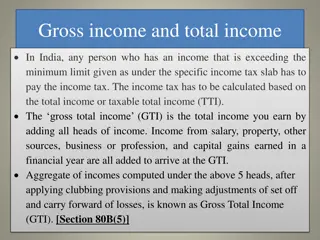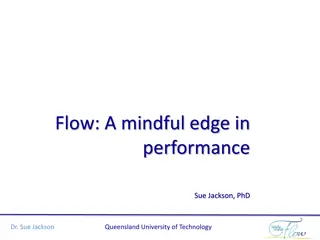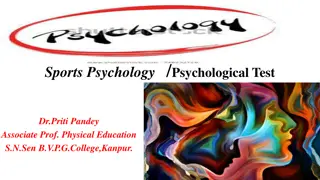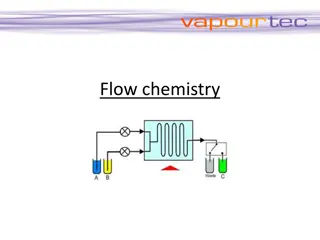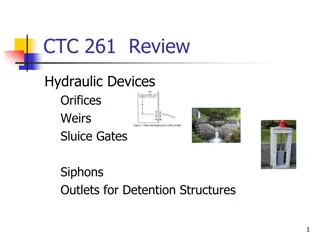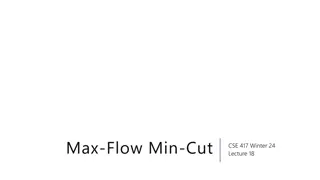The Psychology of Flow: Achieving Total Focus and Optimal Performance
Engage in activities for their intrinsic value, where the ego diminishes, and time seems to vanish - that's when flow occurs. This optimal psychological state involves deep concentration, clear goals, and a sense of control. By embracing challenges and staying in the present moment, one can cultivate a mindset that brings about flow experiences. Explore the essence of flow through insights from Csikszentmihalyi, Zen Buddhism, and practical tips on achieving flow. Dive into the components and benefits of flow to enhance your performance and well-being.
Download Presentation

Please find below an Image/Link to download the presentation.
The content on the website is provided AS IS for your information and personal use only. It may not be sold, licensed, or shared on other websites without obtaining consent from the author. Download presentation by click this link. If you encounter any issues during the download, it is possible that the publisher has removed the file from their server.
E N D
Presentation Transcript
Being completely involved in an activity for its own sake. The ego falls away. Time flies. Every action, movement, and thought follows inevitably from the previous one, like playing jazz. Your whole being is involved, and you're using your skills to the utmost. (Mihaly Csikszentmihalyi)
Flow - defined an optimal psychological state (Csikszentmihalyi) a state of total focus on the task at hand; being in the present moment associated with positive experiences and performance outcomes
Zen Buddhism Before enlightenment, chop wood, carry wood. After enlightenment, chop wood, carry wood. If you walk, just walk. If you sit, just sit; but whatever you do, don t wobble. When hungry, eat your rice; when tired, close your eyes. Fools may laugh at me, but wise men will know what I mean.
Components of Flow 1. Challenge-Skill Balance. A balance between the demands of the situation and personal skills. 2. Action-Awareness Merging. Deep involvement that makes actions seem automatic. 3. Clear Goals. Certainty about what one is going to do. 4. Unambiguous Feedback. Immediate and clear feedback that reaffirms actions. 5. Concentration on Task at Hand. Feeling focused. 6. Sense of Control. Happens without conscious effort. 7. Loss of Self-Consciousness. Concern for self disappears as person becomes one with activity. 8. Transformation of Time. Time passes faster, slower, or there is unawareness of time. 9. Autotelic Experience. Feeling of doing something for its own sake, with no expectation of future reward.
Flow is quite simply when you ve managed to totally get out of your own way. (Floyd Woodrow)
Flow Consider the following questions: List your most common activities. Plot them on the flow state graph (see slide 3). When are you in a state of flow? Can you think of any activities during which time disappears, you are completed absorbed into what you are doing?
A mindset that facilitates flow Identify what is important clear unambiguous goals Move in the direction of what is important, taking into account feedback along the way Embrace challenge Stay in the present moment
Finding flow Pick an activity that you can see yourself enjoying Ask yourself: I value Flow most because it 1. 2. 3. 4. Inspires me to solve challenges creatively; Lets me feel like I m at one with everything that s happening; Is about the only time I can turn off my to-do list; Lets me share amazing moments with others. I find myself in Flow most often 1. 2. 3. 4. Alone or with a tight crew who can keep up; With people so we can build off each other s energy; When I m by myself so I can focus deeply; In serene settings where I feel connected to something bigger than myself. I find Flow when 1. 2. My heart s beating, adrenaline s pumping and it s make or break time; We re all swept up in the moment together and feel connected to something bigger than ourselves; Everything s beautiful and effortless - things happen perfectly; Hours go by and I lose myself in my work and come up with something amazing. 3. 4.
Popular flow physical activities Yoga controlled breathing and a quiet setting are great conditions for focusing your thoughts on what you re doing in the present, here and now. With the right challenge to skills ratio in terms of balance and stretching, some find yoga is very conducive to attaining a flow state. Swimming if you re one who enjoys slightly more intense physical activities, swimming lets you concentrate on your technique, breathing. Plus, there are few distractions when you re physically in the water. Running challenge levels are very straightforward to set when you re running, allowing you to find the ideal balance with your abilities for attaining a flow state. If you find that you sometimes tend to self-talk while running, or think things over, it may help to listen to music or a good audiobook. Rock climbing this activity featured quite frequently in Csikszentmihalyi and others earlier research, thanks to its ability to provide a flexible blend of physical exertion and focus.
Computer game design & flow A challenging computer game can make us feel overwhelmed, and more likely to give up. Similarly, a computer game that is too easy can induce boredom. To trigger flow, a good computer game should be halfway between these two extremes. Levels Points Time limit Prizes









